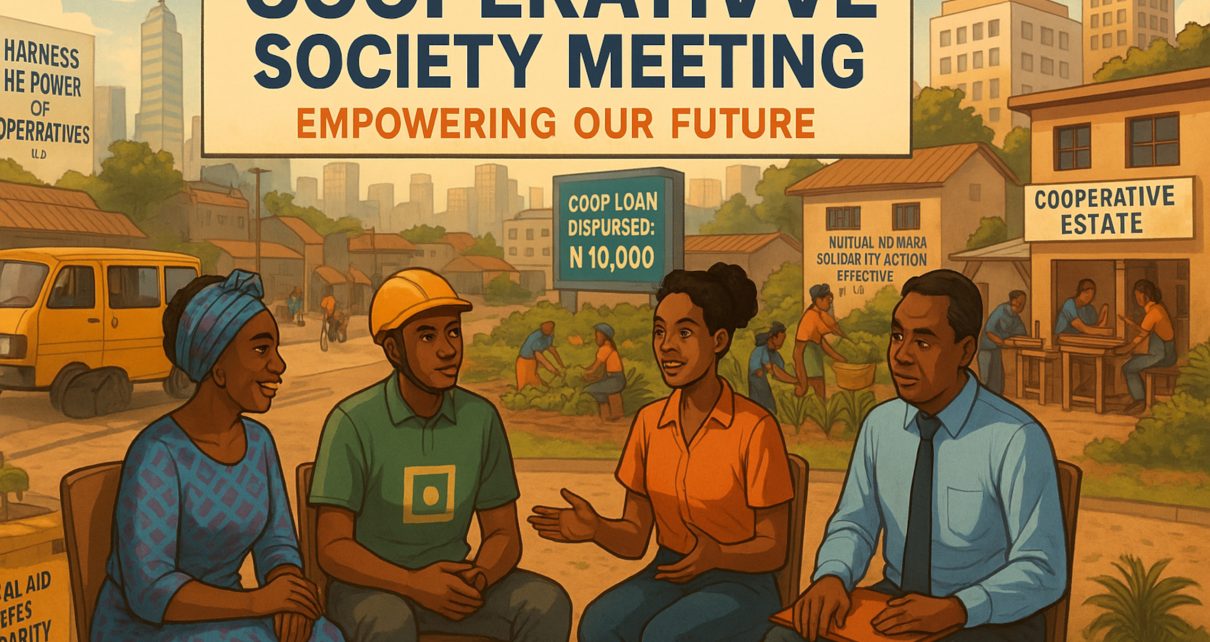By Nkanu Egbe
Lagos, Nigeria’s economic nerve centre, continues to chase ambitious development targets—from housing and transport to job creation and food security. Yet, one of the most powerful tools for inclusive economic participation lies neglected: cooperatives.
In a city where a significant majority of the economy operates informally, the Lagos State Government has rightly invested in structures like the Lagos State Employment Trust Fund (LSETF), the Lagos State Residents Registration Agency (LASRRA), and various MSME support schemes under the Ministry of Commerce, Industry and Cooperatives. But curiously, the “cooperatives” part of the ministry’s portfolio has become little more than an administrative footnote.
The Weight of the Informal Economy
According to data from the National Bureau of Statistics (NBS) and the Small and Medium Enterprises Development Agency of Nigeria (SMEDAN), Lagos hosts over 3 million MSMEs, most of which operate outside the formal regulatory framework. Additional studies by the International Labour Organization (ILO) and UN-Habitat affirm that more than 60% of Lagos’s economic activities occur within the informal sector, encompassing traders, artisans, gig workers, market women, transporters, and street vendors.
The Lagos State Development Plan (2012–2025) also recognises that the informal sector remains a critical pillar of the state’s economy, calling for improved access to finance, capacity development, and regulatory inclusion. Yet, the state has done little to mobilise the cooperative model as a solution.
The Untapped Potential of Cooperatives
Globally, cooperatives are more than thrift clubs. They are strategic engines for:
- Financial inclusion in underserved communities
- Affordable housing through pooled ownership schemes
- Urban food security via agric-based cooperatives
- Creative sector growth through gig-economy co-ops
As Gilbert Houngbo, Director-General of the International Labour Organization (ILO) puts it:
“Harness the power of cooperatives for building inclusive and resilient communities.”
Beyond being a slogan, it speaks directly to the urgent needs of cities like Lagos, where rising unemployment, widespread informality, and deepening inequality demand real, people-focused solutions.
Similarly, Ariel Guarco, President of the International Cooperative Alliance (ICA), reminds us:
“When it comes to cooperate, we people first appeal to institutions whose ordering principle is mutual aid… Cooperatives make solidarity action more effective in responding to common problems.”
In Kenya and India, cooperatives support millions in housing, transport, and agriculture. In Lagos, they could do the same—if the structures that support them were taken seriously.
Existing Structures, Missed Opportunities
The Department of Cooperatives, under the Ministry of Commerce, Industry and Cooperatives, remains largely underfunded and reactive. This is underscored by the fact that, while it records a high number of cooperative registrations annually, these cooperatives often lack follow-up: no capacity building, no audit support, no digitisation tools, and no funding pathways.
Funding bodies like the LSETF largely bypass cooperatives in favour of individual entrepreneurs. LASRRA, which has biometric data on millions of residents, could easily provide verification infrastructure for cooperative transparency—but this integration hasn’t materialised.
What Lagos lacks is a deliberate strategy to reposition cooperatives as modern economic vehicles—not just community thrift groups.
What Lagos Must Do Differently
To reposition cooperatives as engines of urban inclusion, the state must:
- Establish a Lagos State Cooperative Development Authority (LSCDA) to lead policy innovation, digital reform, and sector-specific investment.
- Prioritise cooperatives in key sectors: agriculture, housing, transport, healthcare, and creative enterprise.
- Digitise cooperative operations through LASRRA-linked verification, mobile payments, and transparent records.
- Invest in cooperative education—particularly for youth, artisans, market women, and transport workers.
- Integrate cooperatives into smart city and MSME policy frameworks.
What to Avoid
- Politicising cooperatives for electoral or patronage purposes. Trust must be built, not bought.
- Bureaucracy-heavy processes that discourage registration or innovation.
- Uniform solutions: sectoral needs differ—transport co-ops need fleet insurance schemes; creative co-ops need content rights support.
Final Word
As Lagos envisions itself as a smart, inclusive megacity, cooperatives can serve as community-led infrastructure for progress. They can de-risk the credit system, build trust within the informal sector, and allow government interventions to land more effectively.
ICA Director General Jeroen Douglas has described cooperatives as a “symbol of hope in a world often driven by profit over people and individualism over collective interest.” This is a challenge—and an invitation—for Lagos to rethink how it mobilises its greatest economic asset: the people.
The tools already exist. The Lagos State Government doesn’t need to reinvent them. It simply needs to recognise the cooperative model as a strategic pillar, strengthen the institutions that support it, and give it the room to flourish.
- Nkanu Egbe, journalist and economist, is the Publisher/Editor, Lagos Metropolitan.


